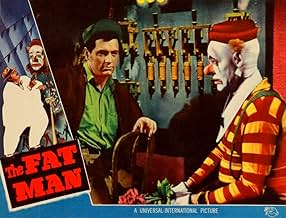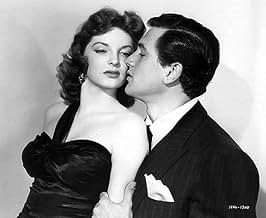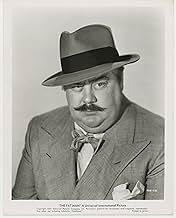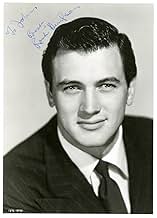Ajouter une intrigue dans votre langueA dentist's murder is investigated by hefty sleuth Brad Runyan.A dentist's murder is investigated by hefty sleuth Brad Runyan.A dentist's murder is investigated by hefty sleuth Brad Runyan.
- Réalisation
- Scénario
- Casting principal
Eric Alden
- Guard
- (non crédité)
Parley Baer
- Police Detective O'Halloran
- (non crédité)
Ray Bennett
- Phil
- (non crédité)
Peter Brocco
- Racetrack Bookkeeper
- (non crédité)
Douglas Carter
- Stage Manager
- (non crédité)
Jack Chefe
- French Chef
- (non crédité)
Avis à la une
The odd subtexts for this film are probably what has buried it. 1. It is based on a popular radio show that sold itself as "created by Dashiell Hammett." Actually the nickname "Fate Man" was that of Gutman, one of the baddies in the Maltese Falco; the character of the radio "Fat Man" was developed out of the otherwise nameless Hammett character "The Continental Op," hero of the Dain Curse and Red Harvest. But in 1951, when this film was about to be released, Hammett was getting sent to prison for thumbing his nose at the McCarthy-era 'House UnAmerican Activities Committee' witchhunters, so his name doesn't appear in the credits (at least not the copy I've seen). 2. With reference to Hammett removed, the character is redefined; while the character remains a tough private eye, he now has acquired a gourmand's taste for good cooking - an obvious reference to the popular Nero Wolfe Character - as well as a shadow of Wolfe's sidekick, Archie Goodwin. 3. This is an early film with Rock Hudson, and it is clear where he was intending to go with his career - a Montgomery Clift without the angst - but just as clearly he decided to change directions - too bad, he's actually quite good in this. 4. This is William Castle before he decided to throw himself wholeheartedly into gimmicky horror movies, and it reminds us that he could be a very capable director when he wanted to be. 5. That the a lead baddie is played by legendary clown Emmett Kelly probably doesn't mean much today, but it's certainly worth a footnote for those interested in the history of clowns.
The story, dialog and acting are all solid; the camera-work, lighting and design are nothing special but certainly competent. The pacing is pretty good. The film keeps its suspense up and provides enough twists to be a real detective mystery. Overall a satisfying mystery from the era when such could still be made.
The story, dialog and acting are all solid; the camera-work, lighting and design are nothing special but certainly competent. The pacing is pretty good. The film keeps its suspense up and provides enough twists to be a real detective mystery. Overall a satisfying mystery from the era when such could still be made.
So this is the film version of the radio series by Dashiell Hammett called The Fat Man - obviously a whimsical referencing of his more famous novel, film and TV series The Thin Man. But this is more than just a gimmick. The corpulent gentleman in question is the masterly J. Scott Smart, whose excess poundage adds much to his screen presence as an unusually charismatic private investigator (with gourmet tastes and a mighty appetite), to whom the rest of the cast really don't measure up. Except for the quite unknown Rock Hudson, in his first major role as Roy, an ex-convict whose teeth play a significant part in the story (and not just because of his famous sunny smile). He speaks his lines convincingly, and we can already see what the production teams meant when they said "the camera loved him". Photogenic wasn't the word.
Otherwise the film is showing both its age and its B-film budget. The dialogue is generally weak, and the continuity not too sharp. We can't always keep up with who's who in the zoo. The dental assistant gives her scream of alarm long before she could possibly have worked out that her boss has been defenestrated. And the over-long sequence of the payroll robbery leaves us unsure whether this was before or after Roy's jail sentence. (You can overdo flashbacks). Also the puritan lobby will wince at Smart's habit of calling every woman 'sweetheart', as well as one brief glimpse of blackface theatre-comedy. Still the ending, which we can't reveal, reminds us of the myriad sub-plots that can emerge when a circus comes to town.
Otherwise the film is showing both its age and its B-film budget. The dialogue is generally weak, and the continuity not too sharp. We can't always keep up with who's who in the zoo. The dental assistant gives her scream of alarm long before she could possibly have worked out that her boss has been defenestrated. And the over-long sequence of the payroll robbery leaves us unsure whether this was before or after Roy's jail sentence. (You can overdo flashbacks). Also the puritan lobby will wince at Smart's habit of calling every woman 'sweetheart', as well as one brief glimpse of blackface theatre-comedy. Still the ending, which we can't reveal, reminds us of the myriad sub-plots that can emerge when a circus comes to town.
William Castle is today mostly remembered for his clever exploitative gimmicks, which made horror films like "Macabre," "House on Haunted Hill," "The Tingler," etc., both terrifying and fun.
But he started out making movies in another tradition—noir. Without gimmicks.
In 1951's low-budget "The Fat Man," made for Universal, Castle borrows from another medium, taking a popular radio mystery program and transforming a broadcast melodrama into an exciting yet droll movie thriller, with unexpected pleasures.
His lead, the basso profundo J. Scott Smart, is exceptionally good in his role as Brad Runyon, alias The Fat Man, a private detective who is not your average PI. Brad is a well-spoken, well-read, pleasure- loving, sweet-tempered, middle-aged, 270-lb mountain of a man wearing a quirky moustache right out of a Nineteenth-Century daguerreotype.
However, The Fat Man is neither a hog nor a dunce. J Scott Smart's full and fine performance turns an unconventional private eye into a charming and intelligent investigator who is much cleverer than anyone else around him. (He's also tough when need be, packing a snub-nosed .32, and even graceful when the occasion calls for it, wowing with his agile and bouncy, if pachydermic dance steps.)
After her employer is found dead, dental nurse Jayne Meadows (in real life, married to pioneering late night TV host Steve Allen) seeks out the food-loving Fat Man, who, in an entertaining intro, is showing a collection – a mélange, if you will -- of a great many chefs how to not spoil the broth.
Certain dental records are missing, and the nurse believes this may have something to do with the dentist's death. (Meadows plays the dental nurse with sympathy and with more than a little sadness.)
The unusual details of the dentist's death and his nurse's obvious distress hit a nerve, and The Fat Man takes on the case for nothing! (Always interested in filling himself, he just can't brush off such a toothy puzzle.)
The trail of the missing dental X-Rays leads Private Eye Runyon from New York City to California -- and to an ex-con, nicely played by a young Rock Hudson.
A sensible professional, Runyon works closely with the police, who cooperate courteously, if warily. Detective Lt. Stark, well-acted by Jerome Cowan, who himself a decade earlier had played Sam Spade's doomed partner in "The Maltese Falcon," treats him as a colleague, a refreshing change from the usual movie thriller adversarial relationship of PI vs. police.
However, another movie tradition, the great sleuth's assistant who is dumber than a pound of wet liver, is still upheld. In a nicely comic turn, Clinton Sundberg handles the chores this chowderhead is saddled with a sweet enthusiasm, submitting to all sorts of indignities with a cheerful grace. Take note that nowhere in this movie does he get a salary check or even a tip.
But The Fat Man has more to worry about than meeting a payroll. He has to sift through a couple more murders, outsmart a den of thieves, figure out the answers to an unsolved half-million-dollar armored car heist involving a posse of rent-a-cops, and face a mysterious, rather scary pratfall of clowns. (In much more than the usual gratuitous guest-star appearance, famous clown Emmett Kelly pops up here in a fully-realized three-dimensional portrayal. He even speaks – and well, at that!)
The plump private eye is put on the trail of a night-club entertainer played by the sultry Julie London, who possesses a valuable secret. Vulnerable under her veneer of hardness, the sensual beauty, who, in real life, was married to TV cop Jack Webb, sends Runyon in the right direction, leading eventually to an exciting show-down which is both scary and surrealistic.
Cameraman Irving Glassberg (celebrated for being one of the discoverers of Clint Eastwood) allocates his limited budget prudently, nourishing the film's noirishness with skill and finesse. His intelligent camera moves restlessly across patterned floors, picking up random gleams from the polished glass and metal of an elegant hotel lobby late at night, the few humans abroad seen as ominous shadows.
A circus subtheme effectively adds still another dimension to the film. At one point, for instance, the Fat Man rents a British two- seat sports car -- an MG or a Morgan -- that looks like it may be too tiny for a five-year-old, let alone a behemoth like himself. As he shoehorns himself into the tiny car, which isn't much more than a roller skate with a motor, you can practically hear it groan. The camera mercifully looks away, before we learn how he manages to squeeze out of it.
In another telling, even unsettling scene, what looks to be a whole platoon of bank guards in black SS-like uniforms tumble out of an armored truck, like one of those teeny-weeny circus clown cars that can hold an entire sideshow of grease-painted circus clowns plus their painted poodles and made-up monkeys plus a lifetime supply of inflated balloons .
Filmed only a few years after the Second World War, in crisp black and white, "The Fat Man," though an unpretentious B movie that sort of got lost in the crowd, is a rich chowder of admirable acting and appealing directorial details. Without gimmicks.
But he started out making movies in another tradition—noir. Without gimmicks.
In 1951's low-budget "The Fat Man," made for Universal, Castle borrows from another medium, taking a popular radio mystery program and transforming a broadcast melodrama into an exciting yet droll movie thriller, with unexpected pleasures.
His lead, the basso profundo J. Scott Smart, is exceptionally good in his role as Brad Runyon, alias The Fat Man, a private detective who is not your average PI. Brad is a well-spoken, well-read, pleasure- loving, sweet-tempered, middle-aged, 270-lb mountain of a man wearing a quirky moustache right out of a Nineteenth-Century daguerreotype.
However, The Fat Man is neither a hog nor a dunce. J Scott Smart's full and fine performance turns an unconventional private eye into a charming and intelligent investigator who is much cleverer than anyone else around him. (He's also tough when need be, packing a snub-nosed .32, and even graceful when the occasion calls for it, wowing with his agile and bouncy, if pachydermic dance steps.)
After her employer is found dead, dental nurse Jayne Meadows (in real life, married to pioneering late night TV host Steve Allen) seeks out the food-loving Fat Man, who, in an entertaining intro, is showing a collection – a mélange, if you will -- of a great many chefs how to not spoil the broth.
Certain dental records are missing, and the nurse believes this may have something to do with the dentist's death. (Meadows plays the dental nurse with sympathy and with more than a little sadness.)
The unusual details of the dentist's death and his nurse's obvious distress hit a nerve, and The Fat Man takes on the case for nothing! (Always interested in filling himself, he just can't brush off such a toothy puzzle.)
The trail of the missing dental X-Rays leads Private Eye Runyon from New York City to California -- and to an ex-con, nicely played by a young Rock Hudson.
A sensible professional, Runyon works closely with the police, who cooperate courteously, if warily. Detective Lt. Stark, well-acted by Jerome Cowan, who himself a decade earlier had played Sam Spade's doomed partner in "The Maltese Falcon," treats him as a colleague, a refreshing change from the usual movie thriller adversarial relationship of PI vs. police.
However, another movie tradition, the great sleuth's assistant who is dumber than a pound of wet liver, is still upheld. In a nicely comic turn, Clinton Sundberg handles the chores this chowderhead is saddled with a sweet enthusiasm, submitting to all sorts of indignities with a cheerful grace. Take note that nowhere in this movie does he get a salary check or even a tip.
But The Fat Man has more to worry about than meeting a payroll. He has to sift through a couple more murders, outsmart a den of thieves, figure out the answers to an unsolved half-million-dollar armored car heist involving a posse of rent-a-cops, and face a mysterious, rather scary pratfall of clowns. (In much more than the usual gratuitous guest-star appearance, famous clown Emmett Kelly pops up here in a fully-realized three-dimensional portrayal. He even speaks – and well, at that!)
The plump private eye is put on the trail of a night-club entertainer played by the sultry Julie London, who possesses a valuable secret. Vulnerable under her veneer of hardness, the sensual beauty, who, in real life, was married to TV cop Jack Webb, sends Runyon in the right direction, leading eventually to an exciting show-down which is both scary and surrealistic.
Cameraman Irving Glassberg (celebrated for being one of the discoverers of Clint Eastwood) allocates his limited budget prudently, nourishing the film's noirishness with skill and finesse. His intelligent camera moves restlessly across patterned floors, picking up random gleams from the polished glass and metal of an elegant hotel lobby late at night, the few humans abroad seen as ominous shadows.
A circus subtheme effectively adds still another dimension to the film. At one point, for instance, the Fat Man rents a British two- seat sports car -- an MG or a Morgan -- that looks like it may be too tiny for a five-year-old, let alone a behemoth like himself. As he shoehorns himself into the tiny car, which isn't much more than a roller skate with a motor, you can practically hear it groan. The camera mercifully looks away, before we learn how he manages to squeeze out of it.
In another telling, even unsettling scene, what looks to be a whole platoon of bank guards in black SS-like uniforms tumble out of an armored truck, like one of those teeny-weeny circus clown cars that can hold an entire sideshow of grease-painted circus clowns plus their painted poodles and made-up monkeys plus a lifetime supply of inflated balloons .
Filmed only a few years after the Second World War, in crisp black and white, "The Fat Man," though an unpretentious B movie that sort of got lost in the crowd, is a rich chowder of admirable acting and appealing directorial details. Without gimmicks.
I recently caught this film, and inspire of its ...slightly above middle-range rating, I decided to watch it.
After all, it's an early Rock Hudson film,but, for me, the real clincher was it had a rare film appearance by the incomparable Ms Julie London.
I'm too young to have experienced the age of radio (but, I did grow up listening, nightly, to CBS Radio Myster Theater to understand just how great it could be), and an eclectic group of actors, as well as directed by Mr William Castle made this too intriguing to not give a chance.
I'm very happy I did.
The story's a classic, 'whodunnit', and it's got all the 'bells and whistles' of a really good noir film (aside from inky-black scenes shot in various locations), including a couple of character actors who should be familiar to most - if not by name, nor appearances, but, by their singular voices, and mannerisms (Messers William Castle,and Marvin Kaplan, as the 'fat man's' assistant, bill, and as 'pinkie', an uncredited role as a delivery truck assistant/brother-in-law).
I never knew Mr Castle had made any noir films, a d after enjoying this one, I really wish he had, because, he knows how to use his abilities in this genre, and have them work to their fullest.
This is a real hidden gem!
After all, it's an early Rock Hudson film,but, for me, the real clincher was it had a rare film appearance by the incomparable Ms Julie London.
I'm too young to have experienced the age of radio (but, I did grow up listening, nightly, to CBS Radio Myster Theater to understand just how great it could be), and an eclectic group of actors, as well as directed by Mr William Castle made this too intriguing to not give a chance.
I'm very happy I did.
The story's a classic, 'whodunnit', and it's got all the 'bells and whistles' of a really good noir film (aside from inky-black scenes shot in various locations), including a couple of character actors who should be familiar to most - if not by name, nor appearances, but, by their singular voices, and mannerisms (Messers William Castle,and Marvin Kaplan, as the 'fat man's' assistant, bill, and as 'pinkie', an uncredited role as a delivery truck assistant/brother-in-law).
I never knew Mr Castle had made any noir films, a d after enjoying this one, I really wish he had, because, he knows how to use his abilities in this genre, and have them work to their fullest.
This is a real hidden gem!
Economy was obviously a concern for Universal and Mark Hellinger. The clip of the man falling to his death is taken right from 'The Spider Woman' (1944) one of Universal's classic Rathbone/Bruce Sherlock Holmes movies.
The second economy was the dress design for Julie London's character (starts at about 26:15). Film noir lovers will instantly recognize it as Kitty's famous evening gown (worn to perfection by Ava Gardner) in Universal's 1947 classic 'The Killers'.
Economies notwithstanding, the solid story and reliable performances (Jerome Cowan (long time Warner Bros. Contract player), Jayne Meadows, and a young Rock Hudson) make this oldie a goodie.
The second economy was the dress design for Julie London's character (starts at about 26:15). Film noir lovers will instantly recognize it as Kitty's famous evening gown (worn to perfection by Ava Gardner) in Universal's 1947 classic 'The Killers'.
Economies notwithstanding, the solid story and reliable performances (Jerome Cowan (long time Warner Bros. Contract player), Jayne Meadows, and a young Rock Hudson) make this oldie a goodie.
Le saviez-vous
- AnecdotesAs Jane Adams (Jayne Meadows) is searching the files for a dental record, she passes an index card bearing the name Ray Chandler, an inside reference to the detective-story writer Raymond Chandler.
Meilleurs choix
Connectez-vous pour évaluer et suivre la liste de favoris afin de recevoir des recommandations personnalisées
- How long is The Fat Man?Alimenté par Alexa
Détails
- Date de sortie
- Pays d’origine
- Langue
- Aussi connu sous le nom de
- Muerte en el circo
- Lieux de tournage
- Société de production
- Voir plus de crédits d'entreprise sur IMDbPro
- Durée1 heure 18 minutes
- Couleur
- Rapport de forme
- 1.37 : 1
Contribuer à cette page
Suggérer une modification ou ajouter du contenu manquant

Lacune principale
By what name was The Fat Man (1951) officially released in India in English?
Répondre


































